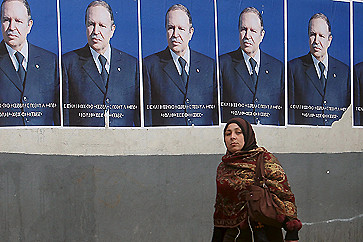
Campaign posters of President Abdelaziz Bouteflika in the North African state of Algeria. The country's people regularly vote on the future political leadership of the nation., a photo by Pan-African News Wire File Photos on Flickr.
Scepticism the main challenger in Algeria election
Wed May 9, 2012 7:59pm EDT
* Government says parliament vote to launch reform
* Many Algerians mistrustful and plan to abstain
* Algeria largely untouched by "Arab Spring" revolts
* People have little appetite for upheavals
By Christian Lowe and Hamid Ould Ahmed
ALGIERS, May 10 (Reuters) - Algeria votes on Thursday in a parliamentary election its rulers hope will deflect pressure for change after the "Arab Spring" upheavals, but many people will show their scepticism by abstaining.
Last year's revolts in the region left Algeria largely untouched, but it is now under pressure to reform and renew the ageing establishment that has ruled the country without interruption since independence from France half a century ago.
The authorities in Algeria, which supplies about a fifth of Europe's imported natural gas, have responded by promising a steady transition towards more democracy, starting with Thursday's vote.
The election is likely to be the fairest and most transparent in 20 years, even though diplomats say it could be flawed. It is expected to give the biggest share of seats in parliament to moderate Islamists, mirroring the trend since the "Arab Spring" in countries such as Egypt and Tunisia.
In a speech on Tuesday, President Abdelaziz Bouteflika, 75, appealed to the country's young people to vote and embrace the opportunity for change.
"I'm addressing the young people who must take over the baton because my generation has had its time," he said. "The country is in your hands. Take care of it."
However, many Algerians distrust the promises of reform. The election is shaping up to be less a contest between political parties and more a tug-of-war between the authorities and a large contingent who think voting is pointless.
"No one deserves my vote. I have been living in a two-room apartment with my five children for years. This election is no different from previous ones. I'm sure it will change nothing," said Abdelghani, a 46-year-old worker at a coffee shop.
Others were less vehement, but still not planning to vote. "It's a day off. I'll take advantage of this opportunity to go on a trip with my children," said Kader, a 37-year-old bank employee.
LITTLE APPETITE FOR REVOLT
Many Algerians believe elections are futile because real power, they say, lies with an informal network which is commonly known by the French term "le pouvoir," or "the power," and has its roots in the security forces.
Officials deny this and say the country is run by democratically elected officials.
Diplomats predict as few as 35 percent of those who are eligible will vote. That would be embarrassing for the authorities. They had hoped a big turnout would give them fresh legitimacy in a year when lavish celebrations are planned for the 50th anniversary of independence.
Nevertheless, there is little appetite in Algeria for a revolt. Energy revenues have lifted living standards, and people look with alarm at the bloodshed in neighbouring Libya after its "Arab Spring" insurrection.
In Algeria, a conflict in the 1990s between security forces and Islamist insurgents, which killed an estimated 200,000 people, still casts a shadow. The fighting started after the military-backed government annulled an election which Islamists were poised to win.
The Islamists set to dominate the 462-seat parliament after Thursday's election are a different proposition.
The strongest Islamist bloc, the Green Alliance, are moderates with close ties to the establishment. Several of their leaders are already government ministers. Bouteflika could appoint one of them as the next prime minister.
The Islamists are on course to displace two secularist parties, also loyal to the establishment, who dominate the outgoing parliament.
There are no exit polls, and first results are not expected until they are unveiled by the Interior Ministry on Friday.
"There is a very strong chance that the Green Algeria alliance will win a plurality of seats," said Geoff Porter of North Africa Risk Consulting.
"Islamist leadership in the parliament, however, is likely to avoid the more difficult issues of political reform, foreign affairs and broader economic policy," he said.
(Editing by Sandra Maler)
No comments:
Post a Comment